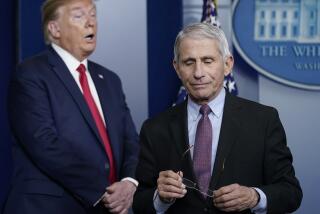Toward Perestroika, Through Science : Soviet Intellectuals Are Asked to Help Reforms Pay Off for All
- Share via
Since the days of Peter the Great, scientists have enjoyed a special and revered status in the Soviet Union. Today this is truer than ever before. Scientists are being asked to play a key role in transforming the country and preventing it from slipping further behind the technological achievements of others throughout the world.
These scientists, some of whom are well known to us in the U.S. scientific community, are being told to bring modern management techniques into the Soviet economy, to introduce computers into industry, to revitalize agriculture and to raise the quality of consumer goods. They are supposed to help reduce arms while maintaining a strong military machine. Most important, they are to serve as a national brain trust to help lead the Soviet Union into uncharted waters.
It is not surprising that Mikhail S. Gorbachev has turned to Soviet scientists for support and advice in this way, or that many of the most talented Soviet scientists have embraced his approach. Gorbachev is a product of Moscow State University, and, unlike previous Soviet leaders, he feels completely at home with scientists and other free-thinking intellectuals. (He even consults Andrei D. Sakharov.)
While serving in senior Communist Party posts with responsibility for agricultural development, Gorbachev presided over farming failures resulting from the obsolete policies of his poorly educated, ideologically biased predecessors. Meanwhile, he saw competing nations enjoying spectacular successes abroad. Gorbachev now oversees a nation with untold military and space-exploration capabilities but also chronic shortages of almost every type of consumer goods.
With such a background he has responded to the urging of many Soviet scientists to unshackle the bureaucratic constraints and unleash the nation’s best minds. He understands, as many Western leaders do, that science and technology are essential not only to military power but also to successful competition in the international economy.
A number of these reform-minded scientists have become part of Gorbachev’s entourage, including Yevgeney P. Velikhov, vice president of the Soviet Academy of Sciences, Roald Z. Sagdeyev, director of the Soviet Space Research Institute, and Abel G. Aganbegyan, a leading Soviet economist and academician. These and other Soviet academicians traveled with Gorbachev during his visit to Washington in December and met at the National Academy of Sciences with prominent members of our scientific, academic and business communities.
The Soviet scientists have not hesitated to propose reforms of their own institutions. Within the Academy of Sciences of the U.S.S.R., a new generation of scientists is rapidly replacing elderly academicians. Open debate has become much more acceptable, and visitors from abroad are welcomed as never before.
The importance of science and technology to the new Soviet leadership can be seen in its reaching out to the West for technologies that can help shortcut the economic development process. Joint ventures, licensing agreements and cooperative programs with foreign firms are the new order of the day. In science, cooperation with Western colleagues is being advocated as ever greater attention is paid to global environmental and health problems and the possibility of cost savings through joint international programs in space, fusion and other areas of big science.
In short, the Soviets’ new leadership grasps the importance of science and technology and intends, as its only alternative to isolation and backwardness, to become an active participant in today’s high-tech world.
This shift clearly offers unprecedented opportunities for Soviet scientists. Yet it also presents great risk. A Soviet colleague told me recently that Gorbachev has begun to urge that scientists not only focus on long-term needs but also suggest ways of increasing productivity and quality over the next year. This points up Gorbachev’s larger problem, which is how to extend support for his reforms beyond intellectuals to include the bureaucracy and the work force. Without this broader base of support, which can be obtained only by an improved quality of life, Gorbachev’s prospects are dim.
The new relationship between the Kremlin and Soviet scientists also presents special opportunities for those of us in the West. A diversion of technical resources away from military confrontation and toward internal development would be advantageous for the citizens of both countries, so long as we continue to give adequate attention to our national security.
Thus many of us in the American technological community are watching developments in the Soviet Union with special interest. We know and respect these Soviet colleagues who are now members of Gorbachev’s brain trust. Yet our special vantage point also makes clear to us how wary we must be of the many obstacles that stand in the way of Gorbachev’s eventual success. The United States must recognize this tension within the Soviet Union as it looks in a positive way to the future of its relations with Moscow.
More to Read
Sign up for Essential California
The most important California stories and recommendations in your inbox every morning.
You may occasionally receive promotional content from the Los Angeles Times.













